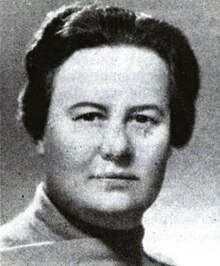Addie Viola Smith | |
|---|---|
 Smith in 1948 | |
| Consul and secretary to the Consulate General of the United States, Shanghai | |
| In office 1939–c. 1942 | |
| Trade commissioner in Shanghai, Bureau of Foreign and Domestic Commerce, United States Department of Commerce | |
| In office January 1, 1928 – 1939 | |
| Assistant trade commissioner in Shanghai | |
| In office November 1, 1922 – December 31, 1927 | |
| Personal details | |
| Born | November 14, 1893 Stockton, California, U.S. |
| Died | December 13, 1975 (aged 82) Mosman, New South Wales, Australia |
| Domestic partner | Eleanor Hinder |
| Education | Washington College of Law (LL.B., 1920) |
| Occupation | Attorney |
| Profession | Foreign Service officer |
| Known for | First female Foreign Service officer in the United States Foreign Service to work under the United States Department of Commerce, first female assistant trade commissioner, trade commissioner in Shanghai |
Addie Viola Smith (November 14, 1893 – December 13, 1975), also known as Shi Fanglan (Chinese: 施芳蘭; pinyin: Shī Fānglán),[1] was an American attorney who served as the United States trade commissioner to Shanghai from 1928 to 1939. She was the first female Foreign Service officer in the United States Foreign Service to work under the United States Department of Commerce, the first woman to serve as an assistant trade commissioner, and the first woman to serve as trade commissioner.
Smith was born and raised in Stockton, California. In 1917, she moved to Washington, D.C. While working for the United States Department of Labor, she attended the Washington College of Law part-time, earning her bachelor of laws in 1920. In October that year she joined the Foreign Service and was assigned to Beijing as a clerk in the trade commissioner's office. Smith was promoted to assistant trade commissioner in Shanghai in 1922, and appointed trade commissioner of Shanghai in 1928, a post she held until 1939. For the remainder of her career, she held several roles in the United States government, international organizations, and the United Nations.
Throughout her life, Smith was also a member of several feminist organizations; scholars have described her international feminist activism as being rooted in imperialist and colonialist attitudes. Smith met her life partner, Eleanor Hinder, in Shanghai in 1926. They lived together until Hinder's death in 1963. Smith died on December 13, 1975, in Mosman, New South Wales, Australia, and was cremated. She and Hinder were memorialized by their friends with two stone seats at the E.G. Waterhouse National Camellia Gardens in Caringbah.